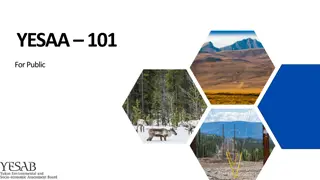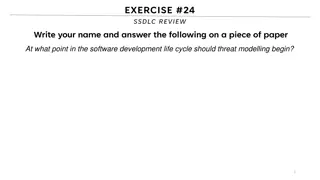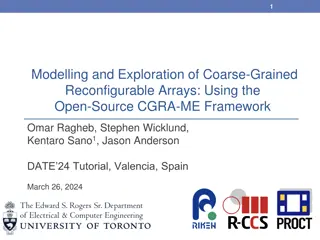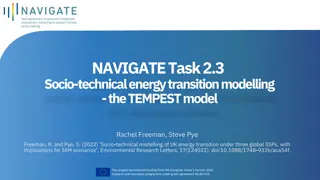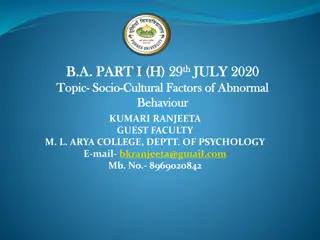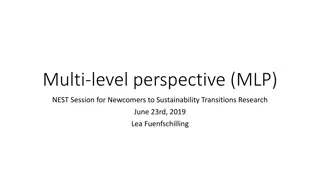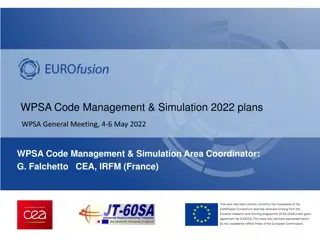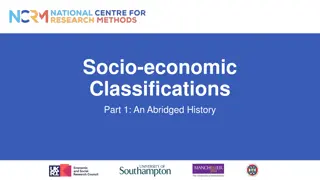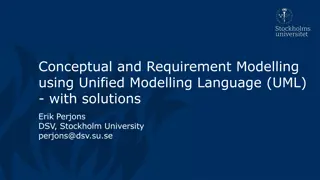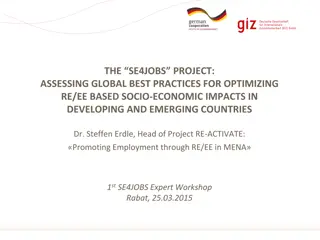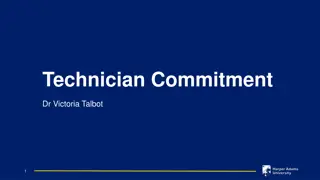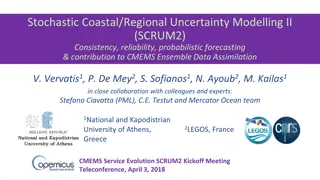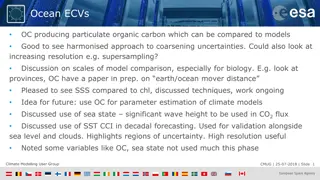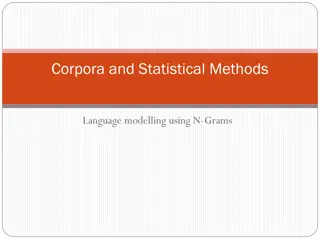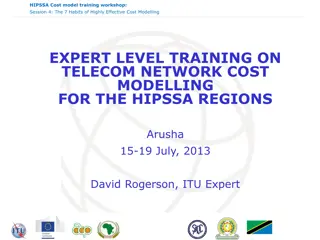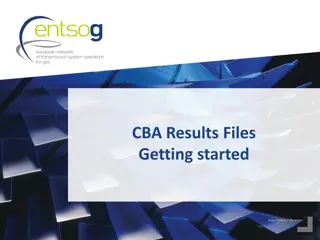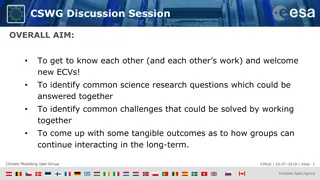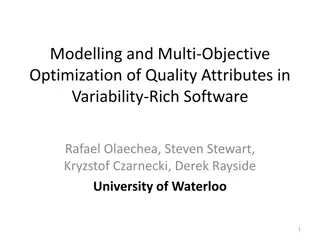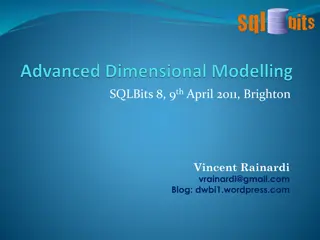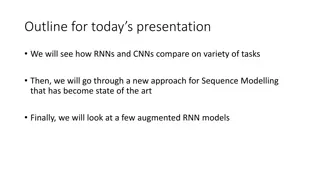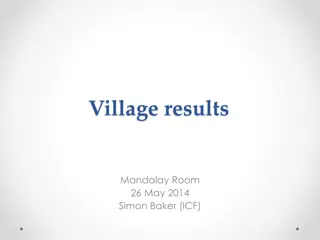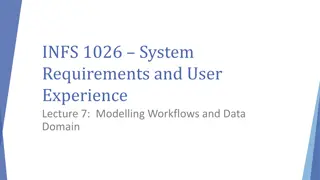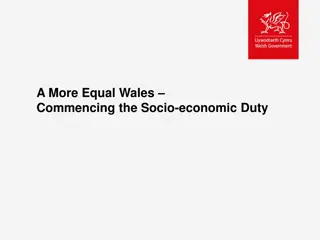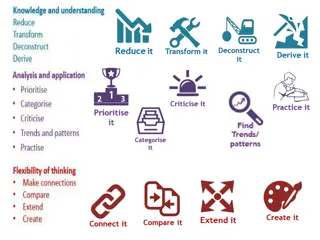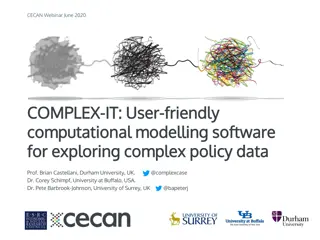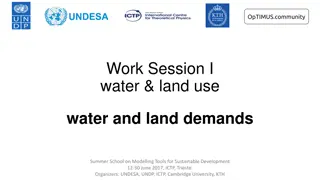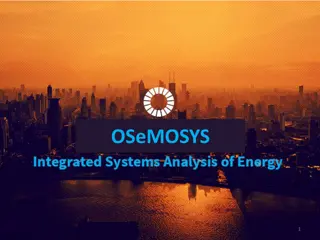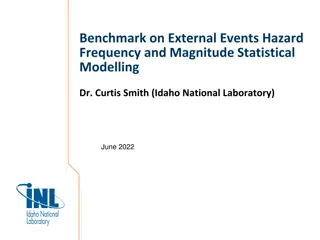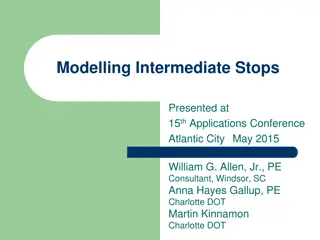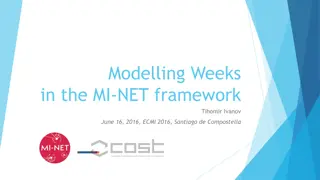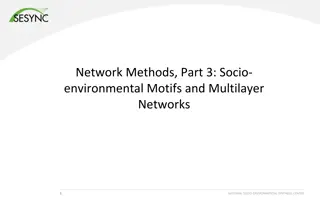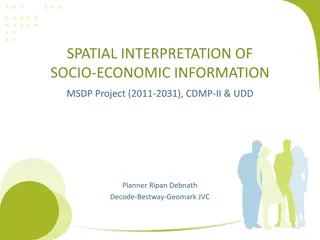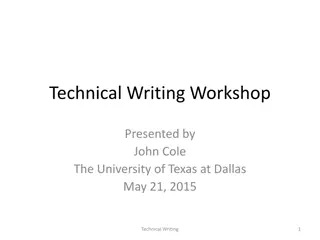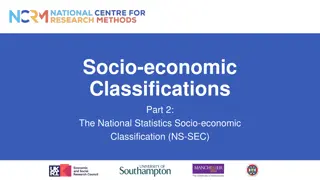Business Modelling and Innovation for Holistic Understanding and Growth
Explore the CGC Aarhus University International Summer Internship Program in Denmark focusing on business modelling and innovation. The program offers a comprehensive learning experience for graduate and postgraduate students, including online sessions and weeks in Denmark. Discover the significance
4 views • 14 slides
Tradeoffs Between Water Savings and GHG Emissions in Irrigated Agriculture
This study examines the tradeoffs between water savings, economic impact, and greenhouse gas emissions resulting from technological changes in the irrigation industry. Key objectives include estimating water savings for different crops, quantifying GHG emissions from new irrigation technologies, and
0 views • 24 slides
Understanding Sustainable Business Models in the Context of Open Data and Socio-Economic Perspectives
Explore the intricate interplay between sustainable business models, open data practices, and socio-economic perspectives presented by Andrew Coote. Delve into the impacts, assessment methods, and the importance of data accessibility in decision-making. Gain insights into the FAIR principles and the
1 views • 16 slides
Understanding the Purpose and Origin of YESAA Legislation
YESAA, the Yukon Environmental and Socio-economic Assessment Act, was developed in collaboration with Yukon First Nations to ensure environmentally and socially responsible project assessments. The Act, passed in 2003, aims to protect environmental quality, heritage resources, and the well-being of
3 views • 19 slides
Modelling Estuarine Habitats in the Upper Sea Scheldt: Human-Induced Adaptations
Explore a research study on modelling estuarine habitats in the Upper Sea Scheldt under various human-induced channel and floodplain adaptations. The study examines the impact of interventions on habitat size, water quality, ecosystem, and more, providing insights into the future of the estuarine en
3 views • 13 slides
Software Development Life Cycle - Threat Modelling Initiation
Threat modelling should commence at the early stage of the software development life cycle to identify potential security risks and vulnerabilities effectively. It should ideally begin during the requirement analysis and continue throughout development, testing, and maintenance phases to ensure robu
3 views • 27 slides
Modelling and Exploration of Coarse-Grained Reconfigurable Arrays Using CGRA-ME Framework
This content discusses the CGRA-ME framework for modelling and exploration of Coarse-Grained Reconfigurable Arrays (CGRA). It covers the objectives, architecture description, inputs required, and tools included in the framework. CGRA-ME allows architects to model different CGRA architectures, map ap
2 views • 33 slides
Socio-technical Energy Transition Modelling: The TEMPEST Model
A simulation model, TEMPEST, incorporating societal and political factors, evaluates UK energy transition under three global SSPs. It analyzes the importance of political capital and societal preferences in adopting mitigation measures. The model's results are compared to the IMAGE model, suggesting
1 views • 5 slides
Understanding Socio-Cultural Factors of Abnormal Behavior in Psychology
Exploring the impact of socio-cultural factors on abnormal behavior, this article delves into the influence of societal pressures, cultural norms, and economic status on mental health. The socio-cultural model emphasizes how societal criteria shape perceptions of abnormality, highlighting the role o
0 views • 7 slides
Understanding Technological Innovation & Sustainability Transitions through Multi-Level Perspective (MLP)
Delve into the history and development of technological innovation from a socio-technical perspective, exploring concepts like niches, regimes, and landscapes. Learn from early references and key researchers such as Kemp, Schot, and Geels about transition pathways, regime shifts, and sustainable dev
0 views • 8 slides
EUROfusion WPSA Code Management and Modelling Activities 2021-2022
EUROfusion's WPSA Code Management and Modelling activities for 2021-2022 focus on developing operation-oriented tools and synthetic diagnostics for JT-60SA scientific exploitation. The tasks include discharge simulator development, breakdown simulator optimization, Energetic Particle stability analy
0 views • 12 slides
Evolution of Socio-Economic Classifications: A Historical Overview
Tracing the evolution of socio-economic classifications from Registrar General's Social Class in 1913 to National Statistics Socio-economic Classification in 2020, highlighting key changes and terminologies over the years.
0 views • 6 slides
Understanding Conceptual and Requirement Modelling Using UML
Enterprise and system models play a crucial role in the business world. This collection of images showcases various aspects of conceptual and requirement modelling using Unified Modelling Language (UML). From business process models to human interactions with software systems, these visual represent
1 views • 92 slides
Global Best Practices for Optimizing RE/EE Socio-Economic Impacts
The SE4JOBS Project aims to identify and analyze global best practices in optimizing socio-economic impacts through RE/EE deployment in developing and emerging countries. By examining key variables and causal relationships, the project seeks to inspire policy debates and decision-making processes to
0 views • 10 slides
Embracing Technician Commitment for Technical Excellence
Explore the significance of being a technician and the evolving landscape in technical skills for the UK economy. The Technician Commitment initiative led by Dr. Victoria Talbot emphasizes the crucial role of technical staff in research, teaching, and knowledge exchange. The TALENT Commission Report
1 views • 10 slides
Stochastic Coastal Regional Uncertainty Modelling II (SCRUM2) Overview
SCRUM2 project aims to enhance CMEMS through regional/coastal ocean-biogeochemical uncertainty modelling, ensemble consistency verification, probabilistic forecasting, and data assimilation. The research team plans to contribute significant advancements in ensemble techniques and reliability assessm
0 views • 28 slides
Insights from Climate Modelling User Group Meeting - July 2018
Discussion at the Climate Modelling User Group meeting highlighted the use of Ocean ECVs, with a focus on organic carbon production and model comparisons. Key topics included increasing resolution, biogeochemistry predictions, and validation using OC CCI data. Various WP projects were also discussed
1 views • 4 slides
Understanding N-Gram Models in Language Modelling
N-gram models play a crucial role in language modelling by predicting the next word in a sequence based on the probability of previous words. This technology is used in various applications such as word prediction, speech recognition, and spelling correction. By analyzing history and probabilities,
0 views • 101 slides
Expert Training on The 7 Habits of Highly Effective Cost Modelling
In this workshop session by David Rogerson, an ITU expert, participants learn the key habits of successful cost modelling in the telecom industry. The session covers identifying, illustrating, remembering, and implementing these habits for effective regulatory cost-modelling practices, with a focus
0 views • 23 slides
Understanding CBA Results Files and Modelling Outputs
The content provides a detailed guide on accessing and utilizing CBA Results Files, including tips on reading the CBA Methodology and understanding various indicators and economic templates. It also highlights the importance of analyzing disrupted rates, quantities, flexibility, and other key compon
0 views • 15 slides
Climate Modelling User Group Discussion Session Overview
The Climate Modelling User Group (CMUG) discussion session aims to foster collaboration among members, welcome new participants, identify common research questions and challenges, and establish long-term interaction mechanisms. The session includes presentations on ECV consistency and planetary visi
0 views • 15 slides
Modelling and Optimization of Quality Attributes in Software Variability
Modelling and multi-objective optimization of quality attributes in variability-rich software is crucial for customizing software functionality to meet stakeholders' diverse needs. This involves addressing conflicting quality requirements such as cost, reliability, performance, and binary footprint
0 views • 34 slides
Advanced Dimensional Modelling: Strategies for Effective Data Handling
Explore advanced techniques in dimensional modelling such as handling rapidly changing dimensions, snowflaking dimensions, and dealing with very large dimensions. Learn about different types of dimension structures, fact tables, and their combinations to optimize data storage and retrieval efficient
0 views • 44 slides
Understanding Cross-Classified Models in Multilevel Modelling
Cross-classified models in multilevel modelling involve non-hierarchical data structures where entities are classified within multiple categories. These models extend traditional nested multilevel models by accounting for complex relationships among data levels. Professor William Browne from the Uni
0 views • 13 slides
Exploring RNNs and CNNs for Sequence Modelling: A Dive into Recent Trends and TCN Models
Today's presentation will delve into the comparison between RNNs and CNNs for various tasks, discuss a state-of-the-art approach for Sequence Modelling, and explore augmented RNN models. The discussion will include empirical evaluations, baseline model choices for tasks like text classification and
0 views • 20 slides
Socio-economic Data Analysis of Selected Villages in Mandalay
This report presents detailed socio-economic data from selected villages in Mandalay, including information on ethnicity, religion, socio-economic background, availability of electricity, civil society groups and activities, source of credit, and water sources. The data provides insights into the de
0 views • 8 slides
Modelling Workflows and Data Domain in System Requirements and User Experience
In this lecture, the focus is on modelling workflows and data domain in the context of system requirements and user experience. The topics covered include recap of use cases, use case diagrams, descriptions, events initiated by stakeholders, defining elements for each use case, use case diagrams, an
0 views • 56 slides
Promoting Equality in Wales: Implementing the Socio-economic Duty
The Welsh Government is prioritizing equality and human rights, especially in the context of Brexit, by commencing the socio-economic duty outlined in the Wales Act 2017. This duty requires specified public bodies to consider how their decisions can reduce inequalities associated with socio-economic
0 views • 13 slides
Understanding Modelling Knowledge and Knowledge Representation
Explore the significance of modelling knowledge through knowledge representation, making it explicit, independent, and reusable. Learn why knowledge representation is essential and how it facilitates exchange, query, inference, and visualization. Delve into examples of knowledge application in vario
0 views • 30 slides
Understanding Scientific Modelling in Atomic Theory
Explore the use of scientific modelling in atomic theory through a learning journey covering topics like the atom, hazards, risks, and atomic structure. Engage in a True or False task to test your knowledge and delve into a video timeline on the discovery of silver and gold elements.
0 views • 11 slides
Introduction to COMPLEX-IT: A User-Friendly Computational Modelling Software for Policy Data Exploration
Explore the capabilities of COMPLEX-IT, a web-based software tool designed to enhance researchers' access to computational social science tools. It offers a compact platform integrating case-based modelling, artificial intelligence, scenario analysis, and more. With an intuitive interface and quick
0 views • 14 slides
Sustainable Development Modelling Tools at ICTP Trieste
In June 2017, a Summer School on Modelling Tools for Sustainable Development was organized at ICTP, Trieste. The sessions covered topics like representation of water supply and demand, incorporation of land use in modelling, energy system diagrams, and structures of energy and water systems models.
0 views • 30 slides
Understanding OSeMOSYS: Energy System Modelling and Linear Programming
Energy systems modelling with OSeMOSYS involves linear programming to determine the optimal energy system configuration. The tool considers factors like demand, available technologies, emissions, and constraints to minimize costs over decades. Linear programming, developed during World War II, plays
0 views • 15 slides
Statistical Modelling of Hazard Frequency and Magnitude in External Events
Dr. Curtis Smith from Idaho National Laboratory presented a benchmark on External Events Hazard Frequency and Magnitude Statistical Modelling. The background involves the Working Group on External Hazards (WGEV) addressing the challenges in formulating and assessing external event initiating events
0 views • 11 slides
Insights into Modelling Intermediate Stops and Tour-Based Models in Transportation Planning
Explore the concept of intermediate stops in transportation modelling, including the development of a new tour-based model in Charlotte. Learn about the challenges faced in modelling stops and the estimation process using the Logit model. Discover how tour frequency, main destination choice, number
0 views • 19 slides
Opportunities at Modelling Weeks: Join for Real-Life Problem Solving
Explore the world of Modelling Weeks where small teams of students work on real-life problems under experienced instructors. Benefits include networking, teamwork, presenting results, and preparing scientific documents. Organize your own Modelling Week with support from MI-NET, focusing on PhD stude
0 views • 11 slides
Exploring Socio-Environmental Motifs and Multilayer Networks
The content delves into socio-environmental motifs, anti-motifs, and multi-plex networks in the context of national socio-environmental synthesis centers. It uncovers the least likely and common occurrences in random networks, as well as common subnetworks underrepresented in the model of inquiry. T
0 views • 7 slides
Spatial Interpretation of Socio-Economic Information in Urban Area
The project focuses on analyzing socio-economic data in Mymensingh Municipality from 2011 to 2031. It includes field verification findings, spatial interpretation results, maps/figures representing family and settlement types, and considerations for urban planning. The presentation outlines basic in
0 views • 35 slides
Comprehensive Technical Writing Workshop by John Cole at The University of Texas at Dallas
Explore the world of technical writing with John Cole, an experienced instructor at The University of Texas at Dallas. This workshop covers the fundamentals of technical writing, including course objectives, programming, course outline, traits of technical writing, and what technical writing truly e
0 views • 58 slides
Understanding National Statistics Socio-economic Classification (NS-SEC)
The National Statistics Socio-economic Classification (NS-SEC) classifies individuals based on their occupation and employment status, ranging from large employers to routine workers. This classification system provides insights into socio-economic trends and disparities in society.
0 views • 7 slides



